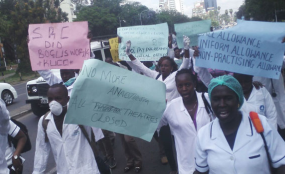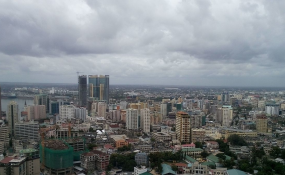By Jeffrey Gogo
Imports of liquified petroleum gas (LP gas), mostly used as cooking fuel, have soared 67 percent to 2,5 million kg per month from 1,5 million kg per month a year ago, as consumers move away from polluting fuels, data from energy regulator ZERA shows.
Should Zimbabwe’s 600 000 domestic electricity users all make the switch to LP gas for their cooking and heating, the equivalent of 120 megawatts could be saved each year, Andrew Guri, a petroleum engineer with ZERA, told The Herald Business Friday, by phone.
As state power utility Zesa Holdings fails to meet 50 percent of the 1 900MW electricity demand from domestic generation, power outages have already forced thousands of urban households to turn to fuelwood, a key source of deforestation, and therefore, warming.
And in a country where 60 percent of citizens are not connected to the electricity grid, urban households already consume one to 3 tonnes of fuel-wood per year, and rural families more than double that, according to research by the University of Zimbabwe.
Now, it has become clearer that LP gas isn’t just a viable alternative, but perhaps the only gateway to keep the cookstoves firing, and to cut the 9,4 percent share of electricity in the average family of six total monthly spend.
“Households are adopting LP gas as an energy source of choice due to its increased acceptance as a clean, efficient, portable and modern energy form,” Guri said, in a separate email.
Since 2012, LP gas consumption has climbed 187 percent to 19 million kg in 2015, ZERA says, much of it used in the home for cooking and heating.
Still, consumers have been slow in migrating from a reliance on fuelwood or electricity. In the national energy mix, liquified petroleum gas, a fossil-derived fuel but one that burns cleanly, accounts for a one percent share, said ZERA’s Guri.
That compares with the 61 percent share for fuelwood and 13 percent for electricity, according to Energy Ministry data.
Dramatic impact
Combined with other national strategies aimed at boosting energy efficiency, such as ethanol blending and increasing investments in hydro and solar power, the switch to LP gas could have a dramatic impact on Zimbabwe’s climate goals.
In total, that will prevent the equivalent of 17 300 gigatonnes of greenhouse gas emissions by 2030, or a 33 percent cut by the same date, everything else in the economy remaining constant, according to a Government plan drawn up under the Paris Climate Agreement.
To undertake these specific interventions, the country will require global financial support of up to $7,24 billion, with Treasury meeting only a fraction of the costs.
Under the Paris Agreement, rich countries blamed for fuelling climate change, have agreed to fund such projects, but money has been trickling in very slowly with just about $10 billion channelled through the Green Climate Fund.
Here, the Zimbabwe Energy Regulatory Authority has already moved to fulfil some of the country’s pledges under the climate treaty.
In May, ZERA passed a law banning incandescent light bulbs, and other high energy consuming products such as fluorescent tubes, from being sold, made or imported into Zimbabwe.
The law would save Zimbabwe up to 40 megawatts of electricity, ZERA chief executive said then, as consumers move to low energy bulbs like LEDs and compact fluorescent.
The ultimate goal is to replace roughly one million filament bulbs in 164 000 households. In a year, the average Zimbabwean consumes just 2kg of LP gas, only a few cents worth, says Mr Guri, the ZERA petroleum engineer.
That’s five times below the per capita consumption of 10kg per year across Africa. Now, this is why Mr Guri believes LG gas use will grow rapidly here.
“There is significant opportunity for growth given that the current per capita LPG consumption for Zimbabwe is low,” he said.
“Zimbabwe can easily double its consumption in the next few years.”
Last Thursday, Michael Kelly, deputy managing director of the Paris based World Liquefied Petroleum Gas Association (WLPGA), an international association of wholesalers and retailers of the LPG, was in the country, seeking to woo the market.
He spoke about how Zimbabwe could gain market access to some of the world’s leading LP gas manufacturers and suppliers such as Total, ORYX Energies, Shell, Respsol and others, through WLPGA. The global association is looking to convert 1 billion people to LP gas by 2030.
Africa-wide, Zimbabwe doesn’t even register on the radar of countries utilising liquified petroleum gas.
At the top of consumers, you have got your Tunisia, Morocco Algeria, Libya and Egypt, where demand averages 55kg per person per year, according to WLPGA data.
Then somewhere far below you have Senegal, Cameroon, South Africa, Ghana, Nigeria and Cote d’Ivoire.
Ronald Ndoro, interim president of the nascent Zimbabwe Liquefied Petroleum Gas Association, which represents 20 wholesalers and retailers, said the aim was to ” . . . increase access to alternative and clean energy” in the country.
Issues of safety still ring loud. Wrongly used, handled, stored or transported, LP gas can be very dangerous because of its high inflammability, posing serious risks to human lives and property.
But through a law passed in 2014, ZERA has sought to provide some comfort.
“Since the law was gazetted, all the LP gas wholesalers are now licensed, retailers have been trained on LP gas standards and are in the process of acquiring their licences,” Mr Guri said, via email.
“ZERA continues to carry out awareness programmes on safe use of LP gas in the homes in the print and electronic media as well as at consumer engagement workshops countrywide.”
God is faithful.










